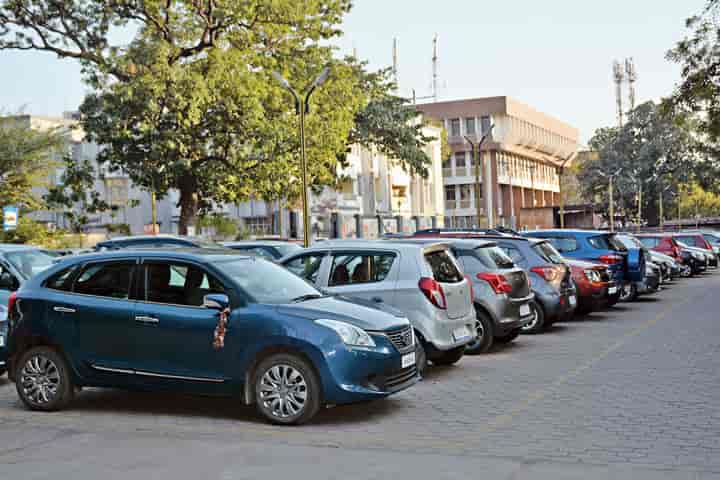Privatization of Public Spaces: India’s Parking Crisis
In the past few years, vehicles lining next to each other in open spaces of residential colonies, around public parks, and even retail establishments have become a common sight to behold. To solve this, people have started to consider the privatization of public spaces to regulate parking and clear the roads.
Spaces that were otherwise reserved for children to play or the aged to take an evening stroll have now assumed the form of undesignated parking lots. And given the rate at which this is increasing, India seems to have accepted it as the inevitable.
 Image Credit
Image Credit
Privatizing public places involves taking something that is meant for collective utilization and using it for personal purposes. Be it any urban city in India – Delhi, Bangalore, or Ahmedabad – parking of private vehicles in public spaces for free has become commonplace.
As a result, cars and two-wheelers are lined haphazardly across the streets, leading to traffic congestion and obstruction to pedestrian movement – a serious parking crisis of sorts.
The root of the problem
The number one argument stated in defence of such a practice is that since vehicle owners pay taxes, not just on the vehicle but also the roads and fuel, they should be allowed to park freely. However, this is not feasible from an economic standpoint. Vehicles are privately-owned goods that require space or real estate to be parked – something which does not come free.
Furthermore, since roads are collective property, the act of free parking leads to ‘privatization of the public spaces,’ which is equivalent to the government using public money to subsidize the storage space for private vehicles.
The answer, therefore, cannot lie in encouraging such a practice but bringing in more paid parking regimes that chargefair prices from vehicle owners.
Proposed solutions to tackle privatization of the public spaces
To prevent public parking spaces from becoming private, the following solutions can help.
-
Proper planning
Through smart parking technologies that inform drivers of empty parking spots in real-time, allow for touchless electronic payments, and more, the entire parking process can be made smoother andfairer.
For instance, such technologies can assign parking fees based on timing, demand, or a particular location. Cities, when planned using advanced tech solutions, should be able to encouragedrivers to seek legal parking spaces..
-
New policies
The government also needs to change the current policies in place. One such significant change can be strict policies on car ownership like limiting the number of cars a person may own or enforcing that a person purchasing a new car must first ensure that a parking space for it is available. This might seem like a radical step but nonetheless one that is necessary to limit the problem of parking privatization.
-
Efficient public transportation
Simply limiting the number of vehicles a person may purchase is only one side of the coin. Cities also need to ensure that their public transportation system is smooth, economical, and efficient. This will automatically encourage people to choose public transport and ditch private vehicles or at least limit their use.
-
Better infrastructure
Proper planning and introducing newer, stricter policies are great, but without supportinginfrastructure, these alone won’t be enough.Just like the tech solutions for parking, the infrastructure should also be advanced. For instance – the development and increase in the number of automated multi-level parking spaces is one way to erect infrastructure that keeps abreast with emerging technologies.
Also Read: Why Parking is Important for Smart City Planning
In conclusion
Currently, most roads in Indian cities, especially the metropolises, are only used at half the capacity because of people lining their vehicles along the streets, sometimes even in the middle! Perhaps the solutions discussed above are our only hope to solve India’s parking privatization crises. What do you think?
